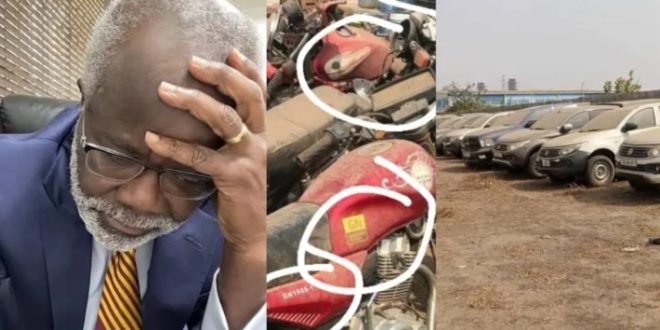Cars, motorbikes and other properties of collapsed GN Bank have been left to rot in a warehouse at Tema, according to Kofi Asamoah Siaw, a former General Manager of the Bank.
In a Facebook post sighted by MyNewsGh.com, Mr. Siaw who is now based in the US said more than 300 vehicles and motorcycles, as well as other machinery, have all been abandoned in a garage.
He revealed that over 3000 jobs were lost as a result of the collapse of the Groupe Nduom Bank.



Siaw Agyapong wrote:
“Today, 16th August 2022, marks the 3rd Anniversary of the reckless decision by the Finance Minister and his able lieutenant, the Governor of the Bank of Ghana, to revoke the license of GN Savings&Loans for purely political considerations.
“Apart from the abandoned offices built by GN, these 300+ vehicles and dozens of motorcycles continue to rot away in an abandoned garage somewhere in Tema.
“The over 3,000 workers too remain jobless whiles the government ends its NABCO programme. If you have no idea how to create jobs, do you destroy what others have built or created? Just tell me if these abondoned vehicles were bought with leaves and the drivers were Chinese nationals.
Even the motorcycles were assembled here in Ghana by other Ghanaians working for GN Motors. Now you see how some private sector people know how to make the cedi stronger?” His post ended.
Cause of Banking sector collapse
Poor corporate governance has been cited as one of the major causes of the collapse of the seven banks by BoG, and other financial analysts.
Board level and senior management were either inactive or engaged in activities that inured to their personal interests rather than to the growth of the banks. For instance, there was the observation that most of the non-performing loans were advanced to people who were related to senior board managers.
Furthermore, Board of Directors of banks failed to oversee bank accounting and corporate reporting systems as well as the external auditing system due to lack of experience or greed.
In addition, Board of Directors failed to provide proper functioning risk management framework. There was also the lack of independence and integrity among Chief Internal Auditors in most of the collapsed banks, leading to cover-ups for executive directors during review processes.The general non-adherence to policies of corporate governance has greatly contributed to the collapse of these banks.
 Home Of Ghana News Ghana News, Entertainment And More
Home Of Ghana News Ghana News, Entertainment And More





